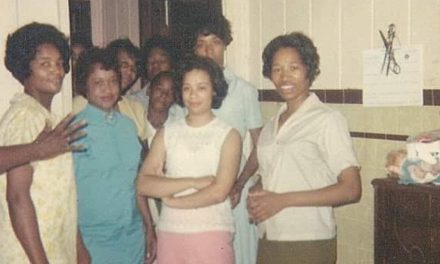Dr. Nicole Price has discovered that wielding empathy as a tool allows her to better serve missions of equity and justice. Now, she invites others to embark on their own Empathy Revolution.
After years of thoughtful practice, Dr. Price saw that taking a human-centered approach to problem-solving made her a more effective leader. Prior to her current role as CEO of Lively Paradox, Dr. Price worked as an engineer and frequently made decisions from a position of logic and reason. She removed herself from hypothetical situations rather than consider what she’d want to happen if she were involved.
During this time, she met Dr. Ian Roberts by chance, immediately intrigued by the stark opposition in their leadership approaches. For eight years, Dr. Roberts consistently posed questions designed to build empathy, helping Dr. Price to better understand the perspectives and processes of others.
“I found that as I started to pay attention more and really try to listen to every single person I encountered, close the gap between us, and listen for the purpose of understanding, I was overwhelmed,” she said. “I probably can’t do this for everybody. But for the people who try to live in accordance with their values of kindness and justice and humility, I think I can get those people to say alright, this is important for me.”
She experienced a monumental shift following the loss of her mother, when she realized that although she was carrying immense grief, it was as if no one noticed. The reflection exercises that Dr. Roberts – now her chief thought partner – presented her with, paired with her struggle with grief, helped Dr. Price realize the importance of having a foundation of empathy.
As a real-life example, she offered an anecdote of a previous job where there was a concern about an employee continuously parking in a visitor spot, despite being reprimanded several times. Dr. Price’s immediate reaction was to inquire about whether there was an adequate number of employee parking spaces, having noticed the packed parking lot on her way in.
A recent change in the company’s shift schedule created a 15-minute overlap – several managers noted that this left an hourly window where employee spots were limited. In response, other managers suggested the employee should simply arrive earlier. Dr. Price pointed out that this wasn’t a solution as whoever arrived last would not have a parking spot available.
“That’s an example of a process that considers the rules over the people,” she said. “We fully believe that if there are processes and rules, people should follow them — rather than taking a keen observation into if people are not following the rules, perhaps the rules are not the best for the people. A human-centered approach recognizes that including perspectives of various types of people, yes, might slow things down, but allows us to make better, smarter, more effective decisions over time.”
Evaluating Inclusion Through Empathy
Dr. Price believes strengthening the empathy muscle allows us to build stronger personal and professional connections with those around us, and also builds a better understanding of our communities. An organization’s representation and commitment to inclusion and diversity can be evaluated through an empathetic process that considers which perspectives are present, and which are missing.
It’s impossible to check every single box in terms of representation and inclusion, especially for small teams and organizations. However, individuals can still be intentional about who they surround themselves with in terms of friends, business partners, consultants, professional and spiritual advisors, and so on. Surrounding yourself with a variety of perspectives and lived experiences can offer insight to your decision making in all areas.
“The inability to acknowledge that when we are going to make decisions, we probably should have the people most impacted in the room used to astonish me, but now it doesn’t,” Dr. Price said. “If you are a leader and you look around you and the people around you do not represent – visually – the difference that you see throughout your organization, throughout your community, throughout your city and state, that means that there is something inherently exclusionary about your process. You should evaluate that process until you start to see representation that matches what you observe throughout the organization.”
It may be difficult to understand someone’s behavior – such as the manager’s inability to understand why their employee couldn’t simply park in an employee spot. Working to empathize with their situation and imagining being in their shoes builds the ability to come up with solutions that may be more helpful to more people, more often.
Dr. Price said in this benign example that it could be as simple as trying to understand why someone may allow their cats on the countertop. For someone who likes cats and understands how difficult it is to train them, having them on the counter may not be a big deal – that doesn’t mean you now have to like cats or allow them on your furniture.
In a more controversial example, someone may struggle to understand a child’s poor school attendance. However, if they listen to try to understand what it’s like for a single parent to work two jobs, while facing mental health challenges, and caring for a child who also struggles with mental health, it may be easier to see why perfect attendance may not be possible.
Demonstrating empathy doesn’t require a response or an agreement. It pushes you to imagine if you shared someone’s lived experiences as they are relaying them to you and recognizes that if you thought what they thought and believed what they believed, you would likely do what they are doing. Empathy works to understand why someone is in a certain situation, rather than judge or shame them for being there.
Equity Versus Equality
Some people possess empathy as a natural skill and don’t recognize their process. Though it is helpful to have this foundation readily available, it also comes with its disadvantages. Sometimes, those who naturally feel empathy can act as though they are superior, shaming others for struggling with the skill or being quick to call them narcissistic.
According to Dr. Price, narcissism is grossly misdiagnosed, having become a buzzword for anyone who may appear indifferent to an issue. In actuality, many people are born empathetic, but life experiences have worn it down over time. They may have been shamed out of expressing emotion or otherwise taught that empathy was a soft trait or weakness.
Over time, individuals can become hardened, thinking that because they struggled and survived, others can and will, too. Adults who were neglected or constrained as children commonly end up perpetuating that experience for others. Once in a position of power, it can be simple to quickly forget the impact of oppressive systems.
Dr. Price believes this is in part because, collectively, Americans possess an individualistic mindset. The mentality of pulling oneself up by the bootstraps offers a baseless belief that if you suffered and were able to overcome a challenge, everyone else who is suffering will end up fine, too. However, it is far more likely that you – and others — would benefit from not having to experience suffering in the first place.
When attempting to identify equitable solutions to problems, many believe providing everyone with equal access to resources is the fairest approach. However, there is a distinct difference between equity and equality. If we make concessions for those most in need, everyone is helped.
“We have such a scarcity mentality that we tend to feel like if someone else gets what they need, and that happens to be more than I received, that somehow that means that I got slighted,” Dr. Price said. “But what a blessing to not need it. I think about my family as a community, and that if the community is healthier, that’s better for me.”
As the sixth child of seven children, Dr. Price used to be bothered that she didn’t always receive the same things as her siblings. As she grew older, she came to understand that she and her siblings were given what they needed to be successful, and that looked different for each person. She encourages people with siblings or multiple children to explore how it could affect everyone to be given the same items or experiences, rather than concessions to fit their specific needs.
Consider the individualist point of view as a sinking ship: if the majority of passengers are fighting to survive, but a group of them remain indifferent to the problem, the ship will continue to sink. Dr. Price warns that maintaining an “us versus them” mindset will keep societal problems alive.
Dangerous Indifference
The fear of dangerous indifference — or the idea that part of the ship’s population will never care about or work to fix the sinking — has led many to believe they need to bring everyone along in their empathy journey, particularly those who are most opposed to their cause. Dr. Price believes this is a distraction that causes individuals to lose focus of the mission and as a result, fails to meet the intended goal.
“We think we’re saviors, we want to convert the people who are hardest to convert,” she said. “We aren’t thinking about the incremental changes we can make with the people we can persuade. I can guarantee you that hatefulness never thinks about, ‘How can I bring along the person who is the most empathetic and the most caring?’” Instead, she suggests looking for people who are not dangerously indifferent, but indifferent simply due to blissful ignorance.
Sometimes, when someone is exposed to the realities of a lived experience different from theirs, it can be hard to believe. When people find the world isn’t the way they once thought it to be, it can be hard to swallow; indifference is borne from the denial they experience from that unique type of loss.
When helping others navigate grief, including in these instances, approaching from a place of empathy and compassion allows us to meet people where they currently are. Together, we can reframe, retrain, and find a new path forward.
“That’s what I’m trying to do for people,” Dr. Price said. “We – and when I say we, I am including me – have to own our responsibility to never really give up on people, and trust and believe that we can teach people this.”
A phenomenon she sees often is psychic numbing: if one person is struggling, they can easily be helped, but if it becomes apparent that hundreds of thousands of people are struggling, it feels impossible to make a difference. This unfortunately results in many of us desensitizing ourselves to the people standing in front of us. We may not be able to solve everything, but we can make an impact on something – what can that something be?
It’s important to remember that you are part of a community, and while you are working on one area of focus, other people are working on others, and that is okay. “You support them, they support you,” Dr. Price said. “This is not possible to do alone.”
She also stressed that empathy is not the same as charity. While there is space for charity, it is a short-term solution. What challenges can individuals try to actively eliminate within their communities so that charity is no longer needed?
“Too often, people will decide that if a problem is too big, we’re never going to be able to solve it,” Dr. Price said. “I think for most problems, there are solutions, and if we look to history, we’ll see that people have solved some of the world’s most unconscionable challenges just because someone said, ‘We’re going to try.’”
Building Empathy: A Strength Training Journey
To build and strengthen the empathy muscle, Dr. Price has created a 14-day journey of exercises and reflections that fit naturally into an existing routine. The exercises are not required to be completed within 14 days; they can be completed over any length of time and repeated as many times as desired.
Each day focuses on a specific area of empathy, including a brief anecdote to contextualize this area, and offers a reflection or thought practice to be mindful of throughout the day. “It’s not extra work, it is within what you’re already doing – you’re already having conversations with people and interactions with people,” Dr. Price said.
Within those everyday interactions, practice can take place discreetly using the provided exercises. Just as Dr. Roberts posed casual reflections to Dr. Price, sparking her personal journey, this approach allows individuals to bring others along with them in strengthening their empathy muscles.








